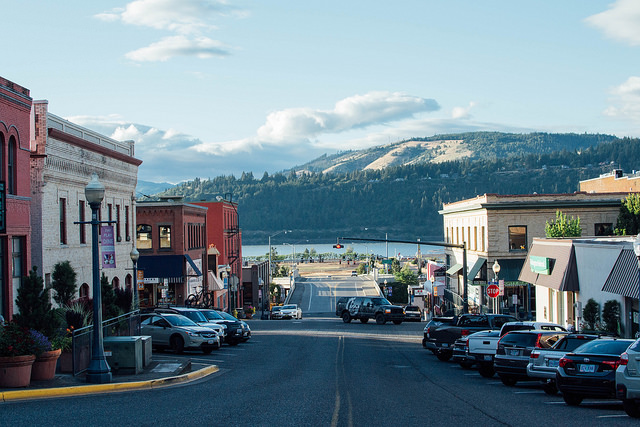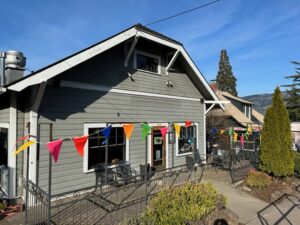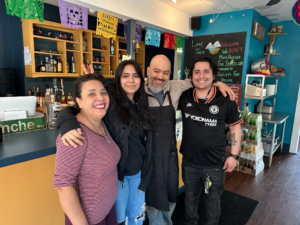In Oregon Hispanic Center, Latinos Finding Home Amid Housing Struggles
My parents first came to Hood River, Oregon, from Mexico as seasonal migrant farmworkers in the ’80s. Soon after my birth in the ’90s, they dropped the migrant and stayed in the valley, only leaving for their homeland during the winter months when work slowed down and fruit season was dormant. They kept up with the winter trips down south until our family got bigger. Then, between school and work schedules, life got in the way and trips to Mexico became less frequent. My five siblings were born and raised here, too. My youngest sibling, age 17, will graduate from high school soon.
While the stunning landscape continues to draw visitors and residents — Hood River County is nestled between the beautiful, snow-covered Mount Hood and the windsurfing world capital Columbia River Gorge — so much has changed in my hometown since my early and teen years. Hood River County’s population increased 7% from 2010 to 2020. Our community feels a little more diverse than it was 10 years ago, but the U.S. Census says Hood River is mostly White, 63% to be exact. The second largest group (32%) identifies as Latino, every other racial group is less than 2%, and some, I am certain, are not counted through the census and forgotten. Hood River County is classified as a Hispanic Center in the American Communities Project.
In the past 30-plus years, Latinos have moved from the margins of the Hood River community into decision-making roles and entrepreneurial opportunities with firm support of ally organizations. But many Latinos struggle to afford decent housing to comfortably stay here, an issue that’s energizing a few community leaders toward change.
Coming into Community
Latino residents remember when the community was very unwelcoming to them. Pedro (name changed for anonymity), who moved into the valley in 1982, describes how he and his wife had tried to dine at a local restaurant in Hood River. Immediately, the staff refused to serve them. When Pedro asked why, they simply told him to leave, while other folks enjoyed their food — folks who didn't look like him. He realized he was experiencing discrimination, he didn't feel welcome, but this was his new home. Other folks have similar experiences, ones they don’t forget. They came here to work but didn't feel part of a larger community that accepted them.
As the demographics change so do residents' lived experiences and community expectations. Today, if someone was refused service, there would be an uproar, for sure! Many groups and community leaders would come together to demand justice, groups like Somos Uno, Columbia Gorge Women’s Action, Gorge Ecumenical Ministries, and Gorge Liberation Movement. Many allies show interest in working toward a better and more just community for all. For example, in September 2020, Gorge Liberation Movement announced that U.S. Immigration and Customs Enforcement (ICE) had been spotted in our community and the word spread quickly! Allies organized themselves to be on watch and call the Gorge rapid response team if needed. It's the beautiful thing about a small community — change feels easier and doable.
Juan Reyes has seen the change firsthand and wears many hats today: He serves as Hood River Valley High School's prevention and graduation coach, works as the LatinX Community Outreach Coordinator at Washington Gorge Action Programs, and volunteers to teach GED courses for adult Spanish-speaking students. The community leader and father of three says, “Living in the Gorge, I have seen this increased sense of community for the Latino community in the Gorge. Not perfect by any means. But more of this willingness to accept one another and help one another. I feel that this has happened due to the new generation of LatinX individuals growing up feeling that they neither fit in here or there. This experience has given way to building bridges between communities in order for no one to feel excluded.”
Tackling the Affordable Housing Problem
However, there’s a big barrier to staying and living in Hood River: the rising cost of housing. Many Latinos are living in low-income apartments or trailer parks or are struggling to keep up with their mortgages. Some households, like Reyes', hold up to three jobs just to stay here and pay their mortgages. Some families are getting creative and joining forces to purchase a house together and splitting the cost between four working adults just to afford it.
I know several community members living in tight housing. One of my mom's former co-workers bought a house with her daughter's family. Meanwhile, a cousin who lives in Section 8 housing is single with two kiddos. One of my high school classmates works in the orchards in exchange for free farmworker housing. She has a degree in accounting and could be somewhere else getting paid more, but would still not be able to afford adequate housing.
More community leaders are starting to address this complex issue. Alex Johnson, who was appointed Hood River Planning Commissioner in January, is particularly interested in how unaffordable housing affects Latino families. "I and so many of my neighbors greatly value the preservation of working lands, but for that to be possible going forward, we have to do a better job of providing housing to all of the people who work on and depend on those lands. The Latino community in Hood River County has been an incredibly valuable part of our social fabric and regional economy for generations, but they are acutely impacted by the lack of affordable housing in our area. As a new Planning Commissioner, I'm working to better understand the needs and perspectives of my Latino neighbors and use those to help guide our county forward on a more sustainable and equitable path," Johnson says.
Big River Community Land Trust President Doug Baker also wants to tackle this issue. “Community Land Trusts are not-for-profits that build and sustain affordable housing in perpetuity to address this critical need, particularly for groups that have not traditionally had access to purchase homes,” Baker says.
He notes that two months ago, the Big River Community Land Trust received a lot on Tucker Road donated by the City of Hood River. "We are in the process of surveying and clarifying lot boundaries. Once completed we will complete our architectural designs and begin construction, hopefully, this year," Baker says. "In the interim, we are working with local stakeholders to assess housing needs, with a particular interest in populations who have traditionally faced housing barriers. We are also working with community members to garner help with the construction of our first house as well as procure additional land and resources to expand our affordable housing development."
So, it’s all in the works. We are in it together, but we need more community decision-makers to be on board and help make the change. We need to create more spaces where monolingual Spanish speakers can voice their concerns and needs so we can continue to build on the beauty of this community.
Hope for Our Town
I have so much hope for our small town. Fifteen years ago, just a handful of Mexican-owned businesses operated where we could find a variety of culturally relevant foods and other specialty items. In January, Maria and Enrique Ortega, a favorite local couple who own Lake Taco Restaurante, opened a restaurant in downtown Hood River, a prime location for business, not an easy feat. The family was able to make the move thanks to a Kickstarter fundraiser. Now, their establishment stands as the first ever authentic Mexican-owned, brick-and-mortar restaurant in downtown Hood River.
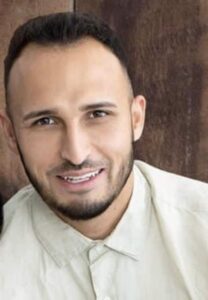
Raul Marquez, one of my high school classmates, shares an optimistic outlook for the community. “Being a Hispanic resident since 1990, I’ve observed the Hispanic community little by little getting involved in community activities and becoming business owners and generating more employment for Hispanics migrating from Mexico in recent years… Hood River now has a few more Mexican stores, small landscaping and construction businesses, but my favorite is that now we have a good variety of Mexican food carts and restaurants. We’ll continue to get out of our comfort zones and take on challenges such as us becoming business owners or some type of managing positions. For that to happen, Hispanics also need that extra push from our fellow American residents that believe in our hard work!”
Marquez is also running for a seat on the Hood River Parks and Rec Board. Residents will vote for this position in a Special District Election on May 16. Marquez's election would add to the number of local Latino leaders in decision-making positions, including Hood River City Commissioner Leticia Valle Moretti, serving since January 2023, and Hood River City Councilor Gladys Rivera, serving since December 2019.
These efforts, decision-maker awareness, and success stories show me that it is possible to support each other in Hood River. We can help our farmworkers own a home if they want to. We are building a collaborative community where BIPOC children won’t tolerate discrimination. We are building the beautiful place we call home.
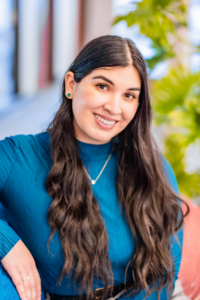 Yesi Castro is the Co-Executive Director of CultureSeed, a local nonprofit in the Columbia River Gorge that offers free outdoor immersion and mental health services to youth. Castro has been doing prevention and health promotion work for more than 15 years. She started her professional career coordinating the Regional Health Equity Coalition in Hood River and Wasco counties, where she became a certified Community Health Worker in 2014. Her work has earned her numerous awards and recognitions, including a national award from Community Anti-Drug Coalitions of America. In 2018, she was featured in the short film I am here by Recreational Equipment Inc.
Yesi Castro is the Co-Executive Director of CultureSeed, a local nonprofit in the Columbia River Gorge that offers free outdoor immersion and mental health services to youth. Castro has been doing prevention and health promotion work for more than 15 years. She started her professional career coordinating the Regional Health Equity Coalition in Hood River and Wasco counties, where she became a certified Community Health Worker in 2014. Her work has earned her numerous awards and recognitions, including a national award from Community Anti-Drug Coalitions of America. In 2018, she was featured in the short film I am here by Recreational Equipment Inc.
